Looking after yourself in winter
Staying healthy in the winter starts with keeping warm, and if you are feeling the cold a lot more than you used to, you are not alone. A cost of living crisis has seen heating bills soar, and even in the best of times, fighting off colds or the flu gets harder as our immune system declines with age. So we thought we’d put together some winter health tips to address any concerns you might have, whether it’s staying warm this winter, reducing your chances of infection, or looking after your mental health and wellbeing.

You may also be interested in..
Why keeping warm matters in the winter
Cold weather isn’t just uncomfortable – it presents a health risk to older people, including those with long-term pre-existing conditions and people with disabilities. If you’re unable to stay warm, you’re at greater risk of a number of health issues in winter:
- Short-term ailments like colds and the flu
- Serious health issues like heart attacks, strokes and pneumonia
- Mental health challenges like depression.
Of course, keeping warm in the winter months is no easy feat. In the 12 months to October 2023, energy prices remain high. According to the Office for National Statistics - UK gas prices in October 2023 were around 60% higher than the previous two years, whilst electricity prices were 40% higher. Plus, the long-term impact of the COVID-19 pandemic has only added to our list of winter health concerns.
With all this in mind, it’s more vital than ever that we take better care of ourselves during the colder months, and our winter health tips look at preventative measures you can take – from figuring out how to stay warm this winter to overcoming feelings of isolation and boosting your immune system.
1. Keep mobile
As we age, a loss of muscle mass means keeping mobile and warm in winter is much more challenging. As the nights draw in and the weather turns, venturing outside, even to run basic errands, can feel like too much effort. However, keeping mobile, even if you are self-isolating or house-bound, is top priority when it comes to staying healthy in winter.
Research shows that spending too much time sedentary ages you more than anything else. Aside from increased risk of diabetes, heart problems and reduced life expectancy, sitting for too long at a time negatively affects bone health, leaving you more prone to fractures and falls.
- Don’t sit still for more than an hour at a time
- Start with what you are comfortable with and build from there
- Try home-based exercises from a seated position
- Make exercise part of your daily routine
- Try yoga or Pilates classes to improve balance and mobility
More advice from the NHS for seniors on keeping active.

2. Eat and drink well
A wholesome diet is key to preventing health issues in winter, even if you are lacking motivation to prepare healthy meals. And whilst it feels like you just want to curl up with a hot drink all day, you must continue to drink water as keeping hydrated helps ward off illness and other winter health concerns.

- Keep a routine such as batch cooking on a Sunday, warm meals at 5pm, and eating porridge for breakfast with a different topping each day.
- Smaller appetites can benefit from eating little and often to build up hunger
- Eat a bit of something you like rather than nothing at all
- Keep cupboards stocked with tins and regularly freeze home cooked leftovers in case of bad weather
- Add fruit pieces to plain water to encourage water consumption
- Superfood smoothies are a quick and easy way to get your 5 a day
Follow these NHS nutritious food tips for boosting energy levels.
3. Get vaccinated
A lack of exposure and immunity to seasonal flu viruses because of lockdowns in 2020 and 2021 mean that getting vaccines is more important than ever for staying healthy in winter.
Free flu jabs are available for the over 50s, carers, those with serious long term health conditions and anyone living in the same household as someone who is immunocompromised. You can book a flu jab with your GP surgery or a pharmacy that offers the service. Find out which pharmacies offer the free flu jab near you.
Over 65s are also entitled to the pneumococcal vaccine which protects against infections that can lead to pneumonia, sepsis and meningitis - all of which are potentially fatal. If you have a long-term health condition such as a serious heart of kidney condition, you are also in need of protection. Find out more about which pneumococcal vaccine you need.
4. Take care of your immune system
In our senior years, staying healthy in the winter becomes ever more important, and that means doing everything you can to boost your immune system and help prevent the spread of disease. Many of the practices we are already familiar with, from washing hands regularly with soap and water to avoiding contact with those who are unwell, could be upheld throughout winter.
- Carry anti-bacterial gel around with you and in the car
- Use a tissue when you sneeze
- Make sure there is ventilation when meeting people inside
- Stock up on cold and sore throat remedies, honey, and lemon
- Consider supplements if you’re not getting your nutritional needs met

5. Keep the house warm this winter
The rising cost of energy and gas have left many of us worried about how to keep our homes warm in the winter. In fact, according to Joseph Rowntree Foundation research from December 2022, more than three million UK households say they can’t afford to heat their homes. According to the Office for National Statistics over 6 in 10 (63%) adults reported using less gas and electricity because of increases in the cost of living, with more than 9 in 10 (96%) of these adults using the heating less.
But where possible, it’s vital to do everything we can to keep warm and protect our health. As we get older, we lose our body heat very quickly, particularly if suffering from certain conditions, and we may not even be aware of a rapid temperature drop. The risk of developing hypothermia is very real and can happen anywhere.
Fortunately, there is support that you may be able to access if you're worried about keeping warm this winter. Under the governments Warm Home Discount scheme, you could get one-off £150 discount off your electricity bill for winter 2023 to 2024. There may also be other helpful payment schemes you maybe eleigibe for so it would be worthwile checking this at www.gov.uk.
Here are some other helpful tips to keep keep safe and warm at home this winter:
- Set your thermostat to 20 / 21 degrees Celsius and keep a steady warm temperature all day – blasts in the morning and evenings won’t be enough
- Invest in a carbon monoxide detector
- Close the curtains to keep the heat in
- Turn radiators off in rooms you don’t use and close those doors
- Use draft excluders against closed doors, or rolled up towels
- After a quick ventilation in the morning, keep windows closed
- Dress warmly by wearing layers, a scarf, thick socks and slippers
- Wear thermal underwear under pyjamas
- Use blankets, a hot water bottle, heat pads, or an electric blanket
What is a warm hub?
Warm hubs, sometimes referred to as ‘warm banks’, are safe, warm spaces where people can drop-in, socialise or relax over a hot drink. Many warm hubs have been set up by local authorities, charities and small businesses with the intention of supporting people in the community who may find it difficult to keep their heating on at home. You can find your nearest warm hub by visiting the Warm Welcome online resource.
6. Stamp out damp
Damp conditions in the home are one of the top winter health concerns as it puts you at increased risk of allergies, colds and chest infections. Signs you have damp include a musty smell, marks on the walls, lifting or peeling wallpaper, walls that are cold to the touch and excessive condensation.
Good insulation is key, especially if you have cold spots on walls where condensation builds up. The Energy Saving Trust has a comprehensive guide on different types of insulation you might need, as well as the quick wins that could make a big difference. A dehumidifier can also help remove moisture in the air which contributes to a build-up of mould.
- Find the source of the damp – leaky gutter, pipes, roof – and plug it
- Use extractor fans in the bathroom to improve ventilation
- Wipe down windowsills every morning
- Hang clothes out to dry outside, not inside
7. Look after your mental wellbeing
Temperatures are low and daylight hours are limited in the winter months, so it’s no surprise that low mood is one of the perennial health issues in winter. When our mood is low, we are more prone to depression, which can have serious impacts on our physical health too. Seasonal Affected Disorder (SAD) is a type of depression that comes about during the change of seasons, usually going into winter. It can affect your mood, sleep, appetite and energy levels. Whilst SAD only affects about 2% of the population a milder 'winter blues' form of it affects many more of us.
Symptoms to be concerned about include persistent low mood, loss of pleasure or interest in normal daily activities, irritability, despair, worthlessness feelings, low self-esteem and feeling tearful. Speak to your GP if this describes how you are feeling. On a positive note, there are many things you can do to stay healthy in winter by looking after your wellbeing
- Expose yourself to natural light by sitting near a window and getting outside as often as you can
- De-clutter with an autumn clean-up and feel instantly better, more organised and in control
- Make your home feel cosy with candles, blankets, big jumpers, favourite hot drinks, and books
- Practice Hygge – feeling cosy and content – by living in the moment and appreciating the little things
- Learn a craft that will keep you occupied during the wintry weather
8. Go for regular walks
According to University of Cambridge researchers, a brisk hour-long walk can eliminate the increased risk of early death associated with sitting for more than 8 hours a day. Plus there’s something exhilarating about going out for a stroll on those bright, crisp winter days.
- Wrap up warm with scarves, hats and lots of layers as temperatures can drop sharply
- Keep your hands and feet especially warm by using hand and feet warmers
- Invest in walking boots with a good grip to combat icy pavements
- Add purpose to your walks such as posting a letter, dropping in on a local friend or visiting the shop
9. Top up your vitamin D
Between October and March is when vitamin D levels are at their lowest, which is why the Department of Health advises that all adults should consider taking a daily vitamin D supplement that contains 100% of the recommended nutrient intake during the autumn and winter months. A University of London study confirms that vitamin D protects against acute respiratory infections including cold and flu, as well as boosts bone and muscle health. Currently, 1 in 6 adults in the UK are deficient in vitamin D.
- Top up your vitamin D by going outside during daylight hours, taking supplements or getting a mouth spray
- Add vitamin D into your diet by eating more salmon or tinned tuna
10. Be honest with yourself
It’s important to acknowledge how you are feeling at any point of the year, but especially if social isolation, cost of living challenges and health issues in winter are getting you down. Part of developing effective coping mechanisms to deal with these winter health concerns is recognising the early warning signs and being prepared.